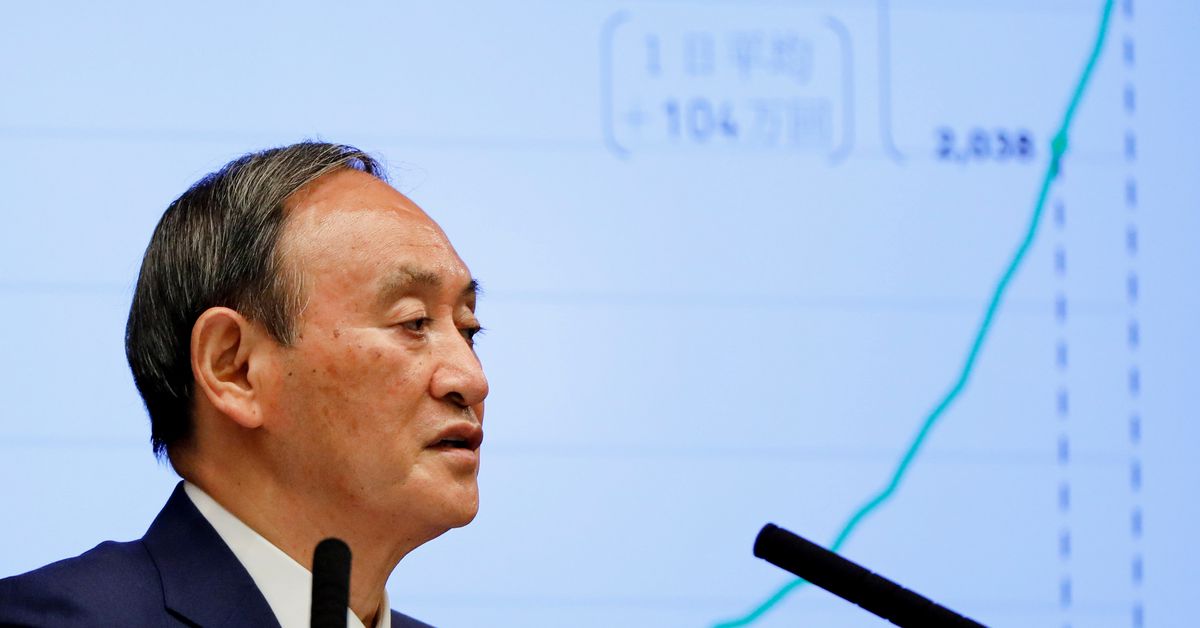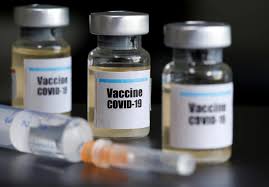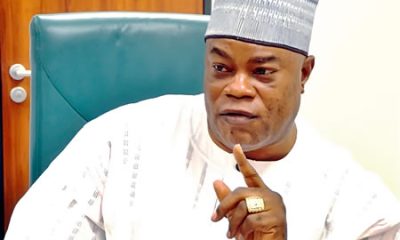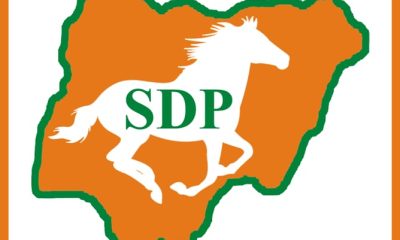Foreign News
Japan PM, Suga to Back Vaccine Minister, Kono to Succeed Him

Japan’s outgoing Prime Minister Yoshihide Suga will back the popular minister in charge of the nation’s vaccination rollout, Taro Kono, to succeed him, Nippon News Network reported on Saturday.
Suga said Friday he will not run for his ruling party’s leadership, effectively ending his tenure and throwing wide open the race for the next premier.
The shock decision after just a year in office comes with Suga’s approval ratings at an all-time low over his government’s handling of the response to the pandemic.
And it suggests a possible return to political instability for Japan, which cycled through prime ministers regularly before the lengthy tenure of Suga’s predecessor Shinzo Abe.
“In one year since I became prime minister, I have poured all of my strength into dealing with the various problems facing the country, with anti-coronavirus measures at the forefront,” Suga told reporters.
He said he realised that running for election and handling the virus response would require “enormous energy”.
“I came to the realisation that I cannot do both. I had to choose one of them,” he added.
Liberal Democratic Party (LDP) secretary general Toshihiro Nikai said he was “surprised” by Suga’s decision not to stand in the Sept. 29 leadership race.
“It’s truly regrettable. He did his best,” Nikai said.
It was a decision that had not been foreshadowed, with Suga dropping no hints of his plans to leave office after just a single year in power and before contesting his first general election.
He came to office last year, stepping into the post left empty when Abe resigned for health reasons.
Suga had been widely expected to seek re-election as LDP leader, with most speculation surrounding only how soon after that he would call a general election.
The election must be called by late October and held by the following month, with the LDP expected to remain in power but possibly lose seats as a result of Suga’s unpopularity.
His government’s approval rating has nosedived to an all-time low of 31.8 per cent, according to a poll by the Kyodo news agency last month.
And recent reports about his plans for a cabinet reshuffle, as an attempt to remedy his unpopularity, appeared to be insufficient.
His decision was likely to be privately welcomed by some in the party, said Tomoaki Iwai, a professor of politics at Nihon University.
“For the LDP MPs it’s a relief that they don’t have to run in general elections under an unpopular prime minister,” he told AFP.
Suga has been battered by his government’s response to the pandemic, with Japan struggling through a record fifth wave of the virus after a slow start to its vaccine rollout.
Much of the country is currently under virus restrictions, and the measures have been in place in some areas for almost the entire year.
But they have been insufficient to stop a surge in cases driven by the more contagious Delta variant, even as vaccination has picked up pace with nearly 43 per cent of the population fully inoculated.
Japan has recorded nearly 16,000 deaths during the pandemic.
The 72-year-old Suga’s rise to prime minister last year capped a lengthy political career.
Before taking the top office he served in the prominent role of chief cabinet secretary, and he had earned a fearsome reputation for wielding his power to control Japan’s sprawling and powerful bureaucracy.
The son of a strawberry farmer and a schoolteacher, Suga was raised in rural Akita in northern Japan and put himself through college after moving to Tokyo by working at a factory.
He was elected to his first office in 1987 as a municipal assembly member in Yokohama outside Tokyo, and entered parliament in 1996.
The news of Suga’s announcement cheered investors, causing the benchmark Nikkei index to gain 1.70 percent after the lunch break.
Analysts said investors expected a change in leadership to boost the chances of an economic stimulus package.
One of Suga’s challengers for head of the LDP is Fumio Kishida, who has already pledged to spend big if elected, and Iwai said the former foreign minister would now be in with a good chance.
“Kishida is probably the front runner, as he is moderate and capable,” Iwai said.
The turmoil makes it likely the election will be pushed back as late as possible, into November, he added. (NAN)
Foreign News
Australian Researchers Launch Open-source, Affordable DNA Measurement Device

Australian researchers have created an affordable, open-source device to measure DNA levels using parts made with a standard 3D printer.
The Do-It-Yourself Nucleic Acid Fluorometer (DIYNAFLUOR) offers an affordable alternative to expensive commercial DNA fluorometers, often out of reach for many researchers.
This is according to a statement released on Wednesday by Australia’s University of Queensland (UQ), which led the research.
Fluorometers, vital for DNA sequencing, which itself is essential for disease detection, therapeutic innovation, and species identification, can now be easily built at home.
Thanks to the simple, accessible device developed by UQ’s Australian Institute for Bioengineering and Nanotechnology (AIBN), the statement said.
The device can be built in under a day for around 60 Australian dollars (about 39 dollars) using off-the-shelf electronics and 3D-printed parts.
It’s with free instructions online and no need for advanced skills or specialised tools, said the designer of the device, Will Anderson, at the AIBN.
Once built, the device quantifies DNA by using a light beam to produce a fluorescent response from the dyed DNA present in the sample.
It would then report the DNA concentration to a connected computer, Anderson said.
“This is crucial information that can tell you whether you can proceed with more expensive tests and sequencing,” he added.
Laboratory tests confirmed the device matches the accuracy and sensitivity of costly commercial models, offering an affordable, open-source solution for researchers in resource-limited, remote, or educational settings, said the study.
Foreign News
Trump Imposes 25% Tariff on Indian Goods, Criticizes Ties with Russia

U.S. President Donald Trump said he is imposing a 25 per cent tariff on goods from India starting on Friday.
Writing on his Truth Social platform, Trump sharply criticises New Delhi for its military and energy ties with Russia.
He described India as a “friend” but accused the country of maintaining unfair trade practices that disadvantage U.
S. businesses.India has “strenuous and obnoxious” trade barriers that keep its markets closed to companies, he wrote, adding that its tariffs are “far too high.
”Trump also took aim at India’s relationship with Russia, saying: “They have always bought a vast majority of their military equipment from Russia, and are Russia’s largest buyer of ENERGY, along with China.
In addition to the new tariff, Trump said India would face a financial “penalty” for its purchases from Russia, though he did not provide further details.
Foreign News
Zelensky Announces New Draft Law on Anti-corruption Bodies after Protests

Ukrainian President Volodymyr Zelensky said he has approved the text of a draft law guaranteeing the freedom of two anti-corruption bodies in Ukraine – days after nationwide protests broke out over changes curbing their independence.
Kyiv’s Western partners had also expressed serious concerns over the legislation.
On Thursday, Zelensky seemed to backtrack, saying the new bill was intended to safeguard the independence of Ukraine’s National Anti-Corruption Bureau (Nabu) and Specialised Anti-Corruption Prosecutor’s Office (Sap), and to protect them from Russian influence.
He said the text of the bill was “balanced”, but did not provide any details.
The law passed earlier this week brought Nabu and Sap under the control of the prosecutor general, who is appointed by the president.
At the time Zelensky justified his decision to curtail the bodies’ powers by citing Russian influence. The day before, Ukraine’s security services had carried out searches and arrests targeting alleged Russian spies at the agency.
The passing of the legislation instantly sparked the largest protests since the start of Russia’s full-scale invasion in February 2022 in several cities across Ukraine, with many worrying the law would severely undermine the Nabu and Sap’s authority and effectiveness.
Thousands of people gathered in streets and squares across Ukraine, holding placards calling for the legislation to be vetoed.
Several commentators accused Zelensky of democratic backsliding. Their concerns were further exacerbated when Ukraine’s Western partners signalled their displeasure with the bill.
Ukraine has official EU candidate status and a spokesman for European Commission chief Ursula von der Leyen previously warned Kyiv that the rule of law and the fight against corruption were “core elements” of membership to the bloc.
On Thursday, the Commission said it “welcomed” the Ukrainian government’s decision to take action against the bill.
“We are working [with the Ukrainian government] to make sure that our concerns… are indeed taken into account,” the spokesman said.
Nabu and Sap were created in 2014-15 as one of the requirements set by the European Commission and International Monetary Fund to move towards a relaxation of visa restrictions between Ukraine and the EU.
Writing on Facebook, opposition MP Oleksiy Goncharenko noted Zelensky said that “the independence of anti-corruption institutions must be guaranteed.”
“First we take it away, and then we say that it must be guaranteed. So why was all this necessary?”
In his message on social media on Thursday, Zelensky did not acknowledge the protests or the backlash but said it was “important that we respect the position of all Ukrainians and are grateful to everyone who stands with Ukraine.”






























